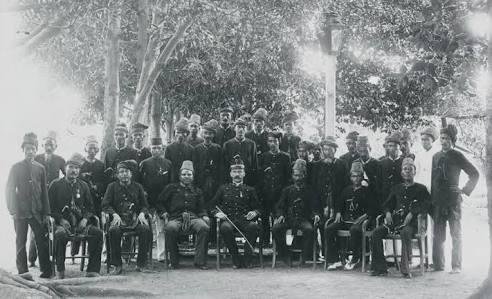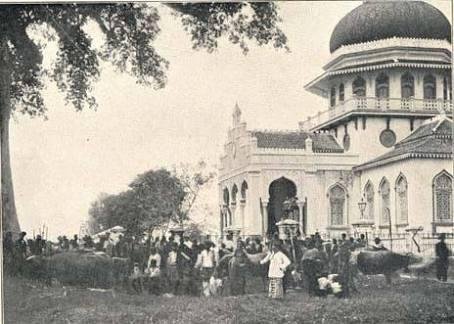
The Aceh War was the war of the Sultanate of Aceh against the Dutch from 1873 to 1904. The Aceh Sultanate surrendered in 1904, but the Acehnese resistance with guerrilla warfare continued. On 26 March 1873 the Dutch declared war on Aceh, and began to fire cannon fire on the mainland of Aceh from the warship Citadel van Antwerpen.
On April 8, 1873, the Dutch landed on Ceureumen Beach under the command of Johan Harmen Rudolf Köhler, and immediately mastered the Great Mosque of Baiturrahman. Köhler then carried 3. 198 soldiers. A total of 168 of them were officers.
The Aceh War was caused by:
The Dutch occupied the Siak area. As a result of the 1858 Siak Treaty. Where Sultan Ismail handed over Deli, Langkat, Asahan & Serdang areas to the Netherlands, whereas those areas since Sultan Iskandar Muda, were under the control of Aceh.
The Dutch violated the Siak treaty, then the end of the London agreement in 1824. The contents of the London agreement is the Netherlands & Great Britain to make provisions on the boundaries of power of the two areas in Southeast Asia with the latitude of Singapore. Both recognize the sovereignty of Aceh.

Aceh accused the Dutch of failing to keep its promise, so that Dutch ships passing through the waters of Aceh were drowned out by the Aceh forces. This Aceh act is supported by Britain.The opening of the Suez Canal by Ferdinand de Lesseps. Causing Aceh's waters to be very important for trade traffic.
The signing of the 1871 London Agreement between England & the Netherlands, in which it contained, Britain gave the Dutch freedom to take action in Aceh. The Dutch must maintain the security of traffic in the Malacca Strait. The Dutch allowed Britain to trade freely in Siak & surrender its territory in Western Guyana to Britain.
Due to the Sumatran 1871 agreement, Aceh established diplomatic relations with the US Consul, the Kingdom of Italy, the Ottoman Empire in Singapore. And sent emissaries to the Ottoman Turks in 1871.
Due to Aceh's diplomatic relations with the American Consul, Italy & Turkey in Singapore, the Dutch made it an excuse to attack Aceh. Vice President of the Council of the Indies Frederik Nicolaas Nieuwenhuijzen with his two warships came to Aceh & asked for information from Sultan Machmud Shah about what was discussed in Singapore, but Sultan Machmud refused to give details.Snouck Hurgronje Strategy Strategy Dutch Spy
To defeat the defense and resistance of Aceh, the Netherlands uses Dr. Christiaan Snouck Hurgronje disguised for 2 years in the interior of Aceh to research the community and state administration of Aceh. The result of his work was recorded under the title Aceh People [De Acehers]. In the book mentioned strategy how to conquer Aceh. The proposed strategy of Snouck Hurgronje to Dutch Military Governor Joannes Benedictus van Heutsz was that the Keumala [ie, the Sultan domiciled in Keumala] with his followers be put aside.
Keep attacking & hitting the clerics constantly. Do not negotiate with guerrilla leaders. Establish a permanent base in Aceh Raya. Show the good intentions of the Dutch to the people of Aceh, by establishing langgar, mosque, repairing irrigation roads & helping the social work of the people of Aceh. It turned out that Dr Snouck Hurgronje's ploy was accepted by Van Heutz who was the military & civilian governor of Aceh [1898-1904]. Then Dr. Snouck Hurgronje was appointed as his advisor.
Chronology of First Aceh War
The First Aceh War [1873-1874] was led by Panglima Polim & Sultan Mahmud Syah against the Dutch-led Köhler. Köhler with 3000 troops can be broken, where Köhler himself died on April 14, 1873. Ten days later, the war raged everywhere. The greatest moment in recapture the Great Mosque of Baiturrahman, assisted by several groups of troops. There are in Peukan Aceh, Lambhuk, Lampu'uk, Peukan Bada, to Lambada, Krueng Raya. Several thousand people also came from Teunom, Pidie, Peusangan, & some other areas. The First Aceh War was a Dutch expedition to Aceh in 1873 aimed at ending the 1871 London Agreement, which followed up on a treaty from 1859 [decided by Jan van Swieten]. Through the endorsement of the Sumatran Treaty, the Netherlands is entitled to the northern coast of Sumatra where there is much piracy. Government Commissioner Frederik Nicolaas Nieuwenhuijzen who arranged for Aceh tried to hold talks with the Sultan of Aceh but did not get what he expected so he declared war on Aceh at the suggestion of the GubJen James Loudon. Coastal blockade did not go as expected.The Dutch then ordered the first expedition to Aceh, under the leadership of General Johan Harmen Rudolf Köhler & after his death his job was replaced by Colonel Eeldert Christiaan van Daalen. In the expedition used Beaumont rifles for the first time but the expedition ended with the return of Dutch troops to Java. It is undeniable that the Baiturrahman Grand Mosque was captured 2 times [and the second time Köhler died]. There was a rush to the palace on April 16 under Major F. P. Cavaljé but was unable to occupy further because of the Acehnese proud as well as the number of dead and wounded soldiers. The Dutch soldier did not have enough preparation to be there for the attack. In addition, the number of [heavy] artillery is not enough & they do not quite recognize the enemy. They themselves must withdraw from the coast & at the direction of Commissioner F. N. Nieuwenhuijzen [who is in communication with the Louj Gubjen] & return to Java Island.
According to George Frederik Willem Borel, the artillery captain, the soldier can gain the coast by getting somewhat more powerful points, but the Marine Commander Koopman can not assure that there is a regular relationship between the banks of the river & the bad monsoon is underway, which is why the arrival of new troops is difficult. After the return of the expedition, the force was widely blamed for the failure of the expedition. That's where the GubJen James Loudon conducts an investigation in which subordinates should judge their superiors. The inquiry then also reaps a lot of controversy and gives rise to "paper war" after the Aceh War I [the pro & contra document continues].
The inquiry still began, following the Second Aceh War, when the captain and chief of staff of the GCE Brigade II. van Daalen refused to be pressed by the Louj Gubjen. The previous reason was that during that time Loudon had ordered an investigation for which his uncle EC. van Daalen, the supreme commander of the first expedition after the death of the previous supreme commander Johan Harmen Rudolf Kohler, as the unfortunate genius after the failure of the expedition, was presented & during the investigation [although later died] Van Daalen, commander of the Indian Forces Willem Egbert Kroesen knew that the Dutch East Indies government was not given enough information on the disruption of arms supply to the troops. Loudon did not allow Van Daalen [nephew] to get Militaire Willems-Order & for it to see that Van Daalen should continue to be sent pension allowances. King Willem II began conferring the Aceh Medal of 1873-1874 on May 12, 1874. What was typical was that the medal bearer could also be buckled with the words "ATJEH 1873-1874? on the ribbon Ereteken voor Belangrijke Krijgsbedrijven. There is also a cross Militaire Willems-Order & Medaille voor Moed en Trouw.
Second Aceh War
In the Second Aceh War [1874-1880], under Gen. Jan van Swieten, the Netherlands succeeded in occupying Sultan's Palace, 26 January 1874, and served as the Dutch defense center. 31 January 1874 General Van Swieten announces that all of Aceh is part of the Kingdom of the Netherlands. When Sultan Machmud Syah died January 26, 1874, was replaced by Tuanku Muhammad Dawood who was crowned as Sultan at Indragiri mosque.
Second Aceh War was announced by KNIL against Aceh on November 20, 1873 after the first attack. At that time, the Dutch were trying to control the entire archipelago. The expedition led by Jan van Swieten consisted of 8. 500 soldiers, 4. 500 helpers & coolies, & later added 1. 500 troops. The Dutch & Atjenese troops were both suffering from cholera. About 1. 400 colonial warriors died between November 1873 and April 1874.
After Banda Aceh was abandoned, the Dutch moved in January 1874 & thought they had won the war. They announced that the Aceh Sultanate was dissolved and annexed. However, the foreign power of restraint interfered, so there were still attacks carried out by the Acehnese. Sultan Mahmud Syah & his followers withdrew to the hill, & the sultan died there due to cholera. The Acehnese announced the young grandson of Tuanku Ibrahim named Tuanku Muhammad Daud Syah, as Sultan Ibrahim Mansur Syah [r. 1874-1903].
The first & second wars are total and frontal warfare, where the government is still well established, although the capital of the country moves to Keumala Dalam, Indrapuri, & other places.

Image sourch : wikipedia
Vote, Comment, follow @aplek